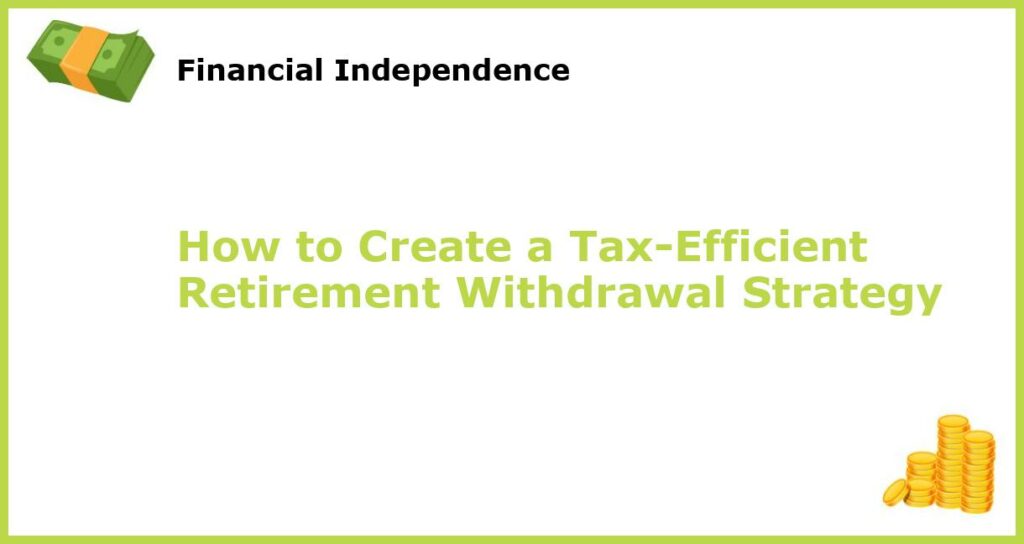Retirement withdrawals can be taxing – both on your mind and on your finances. It’s a crucial time to understand tax-efficient withdrawal strategies to create a smooth financial transition. Here are some tips that can help you make informed decisions when creating a withdrawal strategy:
Know Your Tax Bracket

Understanding the tax bracket you fall in is crucial as withdrawals from traditional retirement accounts such as 401(k)s and IRAs are taxed at your ordinary income tax rate. This means that the higher the tax bracket you fall into, the more tax you pay. Before creating a withdrawal strategy, make sure you know your tax bracket and calculate the tax you’ll have to pay on your withdrawals from traditional retirement accounts.
In addition, you should also understand how your tax bracket may change during retirement. If you expect your tax bracket to decrease during retirement, you might want to delay withdrawals from traditional retirement accounts until after retirement. This can help you reduce the total tax you’ll have to pay on your withdrawals.
Create a Mix of Taxable and Tax-Advantaged Accounts

Having a mix of taxable and tax-advantaged retirement accounts can help you have better control of your retirement income and tax bill. Taxable accounts provide flexibility in terms of withdrawal timing and amount, and they can be useful for funding expenses and emergencies. Meanwhile, tax-advantaged accounts such as Roth IRAs and 401(k)s provide tax benefits that can lead to significant tax savings over time. By having both types of accounts, you can control how much you withdraw from taxable accounts when deciding to withdraw tax-advantaged accounts, which can lead to better tax efficiency in the long run.
Delay Social Security Benefits

Delaying social security benefits can help you create a more tax-efficient retirement withdrawal strategy. If you’re earning any other retirement income sources, primarily taxable retirement accounts, deferring social security can help you save on taxes. By delaying, you can increase your monthly benefit, which can make a big difference in your retirement budget. Additionally, if you wait until age 70 to start receiving social security benefits, you’ll receive delayed retirement credits, which can increase your benefit amount by up to 8% per year.
Plan for RMDs

Required minimum distributions (RMDs) come into play when you turn 70.5 years of age. This means you should be prepared to withdraw a minimum amount from traditional retirement accounts each year. If you don’t take out RMDs, you’ll have to face additional taxes and penalties. To plan for RMDs, you should calculate the amount you’ll need to withdraw each year and factor this into your retirement budget. Depending on your withdrawal amount, you might also want to consider Roth conversions before RMDs kick in to reduce your overall tax bill.
Consider Roth Conversions

Roth IRAs offer tax-exempt withdrawals, making them an excellent choice to avoid additional taxes and penalties. One tax-efficient retirement withdrawal strategy is to consider Roth conversions. This involves moving funds from traditional retirement accounts, such as 401(k)s and IRAs, to a Roth IRA. This conversion will trigger income taxes on the amount converted, but once the funds are in a Roth IRA, they will grow tax-free and can be withdrawn tax-free. Doing this can reduce your tax bill over time, particularly if you expect to be in a lower tax bracket during retirement.
Consult with a Professional
Creating a tax-efficient retirement withdrawal strategy can be complex, particularly if you have multiple retirement accounts, and you’re not sure how to maximize tax efficiency. Consulting with a financial professional can help you create a more effective strategy. A professional can help you determine the best type of accounts to invest in, how much you should withdraw, and how frequently, and which tax bracket you fall into. They’ll also help you review your retirement budget and expenses to create a sustainable plan.
Withdrawals Shouldn’t Affect your Medicare Premiums
One hidden cost of retirement withdrawals is how they affect your healthcare premiums. Your healthcare premiums are essential, and you don’t want your retirement withdrawals to affect them. If you’re in a relatively high tax bracket, you might end up paying more for Medicare premiums. Avoiding high-income tax brackets can help you save money on Medicare premiums in the long run. By reducing taxable income, you can stay within the thresholds that trigger higher premiums.
Track Your Expenses
Tracking and monitoring your expenses can help you understand how much you need to withdraw during retirement. By keeping a record of your expenses, you can create a more realistic budget and make informed decisions concerning your tax-efficient retirement withdrawal strategy. You can also identify areas where you can save money and cut expenses, which can help you stretch your retirement budget further.
Be Flexible
It’s crucial to be flexible when creating a tax-efficient retirement withdrawal strategy. Life throws surprises, and the market fluctuates, so you must be prepared to adjust your withdrawal strategy accordingly. By having a flexible withdrawal plan and working with a financial professional, you can make informed decisions about when and how much to withdraw, and adjust your plan as necessary.







